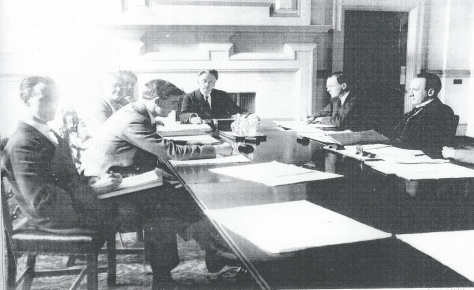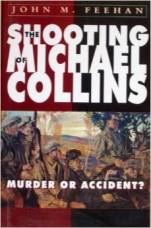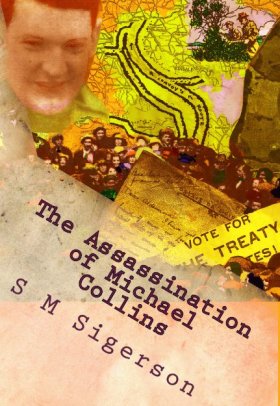
Free State Provisional Government Cabinet 1922 – Collins leaning forward on the left; Ernest Blythe opposite him, Cosgrave at the head of the table
‘We find, then, two independent bodies with a very direct interest in getting rid of Collins, viz, the junta within the Cabinet and the British secret service.’
– John M Feehan
In 1922, shortly after the Irish took power in Dublin, how did the Collins-Griffith government become the Cosgrave-Blythe government overnight? And with what consequences for Ireland?
On the relationship between the Cosgrave-Blythe government, and the death of Collins, here are some excerpts from
“The Assassination of Michael Collins: What Happened at Béal na mBláth?”:
“In his seminal biography, Tim Pat Coogan [pointed out] that Collins’ policy on the North was ‘unwelcome to his Cabinet colleagues and of course to the British.’ In this he supports that Collins was serving on the [Free State Provisional Government] with men whose agenda for the future of Ireland was closer to the British, than to his own. This in itself speaks volumes. John M Feehan (in ‘The Shooting of Michael Collins: Murder or Accident?’) went even further:
‘Collins never concealed his contempt for [WT] Cosgrave, whom he regularly referred to as “that bloody little altar-boy.” He detested [Ernest] Blythe and distrusted Eoin MacNeill and the feeling on their side was mutual, although for political reasons he had to have them in the cabinet.’
“… Exactly one month before the C-in-C’s untimely demise, W T Cosgrave (former Minister for Local Government, and, until then, not a luminary in national affairs) became Chairman of the Provisional Government in Collins’ place… Think how convenient it was, one month later, that Collins’ successor was already sitting at the head of the Provisional Government, when both Griffith and the C-in-C suddenly died within two weeks of each other. And with them, all hope of an amicable settlement with honor to the Civil War. All hope of merging anti-Treaty heroes from the War of Independence into the leadership of the Free State Army. And, with their deaths, organized political and military resistance against unionist pogroms in the north was effectively suspended.
“The Collins-Griffith government became the Cosgrave[-Blythe] government, indefinitely; with a very different direction for Ireland indeed. Soon after commenced Dublin’s shooting without trial of Irish prisoners. The Free State seemed to become everything the anti-Treaty side said it was; in an Ireland dominated by what J J Lee would call:
‘...the flint-minded [people] whose grandparents had done well out of the Famine and who intended to do better themselves out of the Free State.’
“Was the Treaty and the Civil War which it ignited, in a sense, the ‘counter-revolution’? A strategy to put the breaks on the independence struggle; to extirpate its most effective leadership; and replace that leadership’s agenda? In this case, with a Dublin government less staunchly opposed to cooperation with imperialist interests: even willing to perpetuate old policies of colonialistic exploitation?
‘There are a lot of unanswered questions and mysterious incidents which [the Cabinet] could have cleared up and did not, and if the finger of guilt is sometimes pointed at them they have only themselves to blame.’
– John M Feehan“
Read more
“The Assassination of Michael Collins:
What Happened At Béal na mBláth?“
by S M Sigerson
Paperback or Kindle edition here:
www.amazon.com/dp/1493784714
All other e-reader formats:
www.smashwords.com/books/view/433954
Read reviews:
http://www.rabidreaders.com/2014/12/03/assassination-michael-collins-s-m-sigerson-2/
Or ask at your local book shop
 “The Shooting of Michael Collins:
“The Shooting of Michael Collins:
Murder or Accident?”
by John M Feehan
http://www.amazon.com/Shooting-Michael-Collins-Murder-Accident/dp/0946645035
“Michael Collins”
by Tim Pat Coogan
http://www.timpatcoogan.com/books/michael_collins.htm
 Ireland 1912-1985 Politics and Society by JJ Lee
Ireland 1912-1985 Politics and Society by JJ Lee
https://www.goodreads.com/book/show/36225796-ireland-1912-1985




